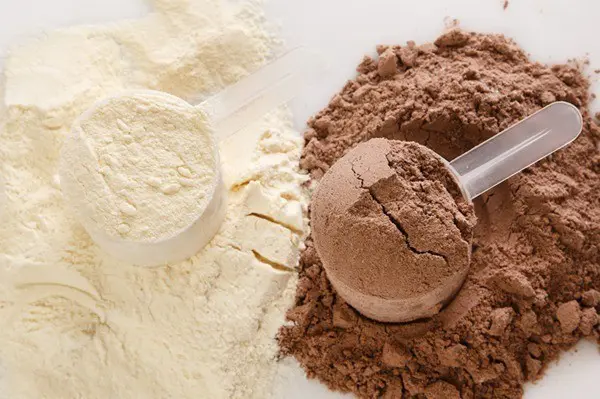My clients often ask me, “Should I drink protein shakes before bed?” As I always say to them, drinking protein shakes before bed is a good idea if your goal is to build muscle, but this isn’t something that will make a massive difference.
Late-night protein shakes probably won’t be a game-changer because protein intake timing isn’t as important as total protein intake. But all of this is a bit more nuanced, so in this article, we’ll explore the benefits and drawbacks of consuming protein shakes before bed to paint a clearer picture. We’ll also explore scientific data and see what the experts say so that no stone is left unturned.
4 Reasons You Should Drink Protein Shakes Before Bed
Drinking protein shakes before bed is wildly beneficial for your health and fitness goals. A late-night shake can aid in muscle recovery and improve muscle protein synthesis, but that’s far from all there is to them. So, let’s look at all the reasons why you should drink protein shakes before bed.
1. Enhances Muscle Growth
Downing a protein shake before bed provides your body with ample amino acids required for muscle growth during the night. This can be particularly beneficial if you train later at night, as your muscle tissue will require more amino acids for repair and growth.
A steady supply of protein, or better yet, amino acids, helps stimulate muscle protein synthesis. Muscle protein synthesis (MPS) is a process through which new muscle tissue is formed. Now, the MPS rate is not quite high during the night, so having sufficient protein in your system helps rev up the process and build lean muscle tissue while you sleep. (1)
Is It Better To Eat Protein Early On or Late At Night — Dr. Andrew Huberman Answers:
Dr. Andrew Huberman, neuroscientist and professor at Stanford University, has discussed protein intake timing on several occasions. Here’s what he said regarding consuming protein later in the day:
“We can utilize the proteins that are ingested early in the day better than we can utilize the proteins that are ingested later in the day, and of course, there will be factors that can shift that. For instance, if you work out very hard with resistance training later in the day, resistance training is known to increase protein synthesis, so it stands to reason that ingesting amino acids after that training would be beneficial.”
2. Improves Muscle Recovery
When you sleep, your body naturally goes into a state of recovery and repair, and having enough amino acids in your system helps repair damaged muscle tissue. As established, protein intake before sleep optimizes overnight muscle protein synthesis, leading to growth. However, for the muscle to grow, it first must heal, meaning protein shakes before bed are excellent catalysts for improved recovery.
And we’re not just guessing here. A 2012 study showed that protein ingestion 30 minutes before sleep provides a massive boost to MPS and, thus, recovery. (2) According to this study, the rate of MPS in subjects drinking protein shakes was approximately 22% greater compared to the control group.
Dr. Jacob Wilson (Ph.D., Skeletal Muscle/Exercise Physiology) had this to say about nighttime muscle protein synthesis:
“When you consume protein before bed, you can recover faster between workouts. That’s great because the faster you can recover, the more frequently you can train. And, the more frequently you can train, the more gains you can make.”
3. Boosts Metabolism and Helps With Weight Loss
Protein has a higher thermic effect than carbs and fats, meaning your body needs more energy to digest and absorb it. Theoretically, drinking protein shakes shortly before bed should boost your metabolism, helping your body burn more calories while you sleep, which could help you lose weight.
However, there is little to no evidence supporting this theory. In fact, a 2016 study showed that consuming casein protein powder before sleep didn’t affect fat or glucose metabolism. (3) So, if you’re looking to lose weight, it’s probably better if you don’t consume any calories before going to bed.
4. Improves Sleep
Getting adequate sleep helps build and repair muscle, and drinking protein shakes before bed could help you fall asleep faster. Protein shakes contain tryptophan, an amino acid that helps the body produce serotonin. (4)
Serotonin plays a key role in regulating bodily functions such as mood and sleep and is a precursor to melatonin, the hormone responsible for regulating sleep. By boosting melatonin production, a nighttime protein shake can help you fall asleep faster.
However, its effects on sleep quality are seemingly minimal.
What Are the Drawbacks of Drinking Protein Shakes Before Bed?

Late-night protein shake consumption could also be a bad idea. Here’s why:
Sleep Disturbances
While I just said drinking shakes could help you fall asleep, that’s not the whole story. As we established, protein digestion requires a lot of energy, and that’s precisely what could disrupt your sleep.
Metabolizing protein can raise your core temperature, hindering your ability to relax, fall asleep, or maintain deep, restful sleep. As you might know, your body temperature needs to drop by 2–3 degrees Fahrenheit to fall and stay asleep, which can be quite hard to do when your stomach is full of protein.
Furthermore, consuming a lot of liquid before bed can increase the chance of nighttime urination, which could wake you up and force you to get out of bed.
Derek from the More Plates More Dates YouTube fame, the man behind the Gorilla Mind supplement line, is one of the most respected people in the fitness industry. Despite the lack of professional credentials, Derek is considered to be one of the world’s leading experts on supplements, and while his stance on protein before bed is quite positive, he had this to say about its effect on sleep:
“Any sleep specialist, sleep doctor, or anyone who is an expert in this field is going to tell you to try and aim to stop eating a few hours before bed. And if you are going to eat before bed, they will tell you, “Don’t use protein before going to bed.” And they’re especially going to tell you, “Don’t double up on your protein.” The reason being… You need to drop your body’s core temperature by two to three degrees Fahrenheit to get into proper sleep cycles. So, if you are doubling up your protein requirements, like literally backloading it to a point where you’re allocating a giant chunk of your daily allotment right before bed, you’re spiking your body’s temperature right before you go to sleep and completely mess your chances of getting a good, quality sleep.“
Weight Gain
Even if you consume 25 grams of whey isolate with nothing but water, you are still ingesting 100–105 calories. Depending on how much you’ve eaten during the day, those 100 calories could put you in a caloric surplus, eventually resulting in weight gain.
While it is true that most of that protein will be utilized to repair your muscles and that extra weight could be lean muscle tissue, in some cases, you could also end up with unwanted fat.
Digestive Issues
Protein shakes cause digestive discomfort for some people, especially when we’re talking about lactose intolerant people consuming whey concentrate. Individuals with sensitive stomachs or conditions like IBS are also prone to digestive issues after consuming protein shakes.
Now, as the digestive system slows down during sleep, a heavy protein load could exacerbate those problems, leading to bloating, gas, or constipation.
Should You Drink Whey or Casein Protein Before Sleep?
For decades, people have favored casein as the go-to protein source for nighttime due to its slow digestion rate. Supposedly, the slow digestion rate provides a steadier supply of amino acids throughout the night, making it superior to whey. However, there was never any substantial evidence supporting this theory.
According to a study published in the Sports Medicine journal, you should drink whey protein before sleeping. (5)
This randomized controlled trial compared the effects of pre-bed whey and casein protein ingestion on overnight muscle protein synthesis after endurance training. While the study eventually concluded that both proteins significantly increased both myofibrillar (muscular) and mitochondrial MPS compared to placebo without significant differences between the two, the conclusion doesn’t tell the whole story.
Firstly, this debunks the myth that whey’s rapid absorption diminishes its effectiveness on overnight anabolism. In fact, drinking whey protein shakes resulted in significantly higher rates of myofibrillar protein synthesis (35% to 18%) compared to drinking casein.
Secondly, whey protein led to a much quicker and higher increase in plasma amino acid levels (especially leucine) shortly after consumption, with casein overtaking the lead only in the final two hours of sleep.
Finally, when comparing mitochondrial MPS rates between the two, whey protein was once again noticeably superior to casein. Compared to placebo, drinking whey protein shakes increased mitochondrial MPS rate by 37% (on average) compared to casein’s 23%.
However, this is just one study, and we can’t interpret these findings as the absolute truth, so if you prefer casein, you’re free to have it. Ultimately, the amount of protein you consume will have a much greater impact than choosing between casein and whey.
How Much Protein Should You Have Before Bed?
There is no one-size-fits-all answer to this question. One of the studies I referenced earlier recommends taking 40 grams of protein before bed, which fits the general guideline of 20 to 40 grams per shake, but that is just a recommendation.
The amount of protein you should drink before bed is dictated by your weight, goals, activity levels, and, most importantly, your daily protein intake. In other words, if you’ve already consumed 200 grams of protein during the day and you’re a 180-pound individual on a bulk, you don’t need any protein before bed.
Generally speaking, the more active you are, the more protein you’ll need, but then again, it is highly unlikely you will need more than 1 gram of protein per pound of body weight, even if you’re trying to build muscle.
Try our protein intake calculator.
How Long Before Bed Can You Drink Protein Shake?
On average, you should drink your protein shake between 30 and 120 minutes before sleep. However, this is not set in stone and will not have a massive impact on your recovery, growth, or athletic performance.
The reason why you should drink protein shakes 30 to 120 minutes before bed is to minimize digestive discomfort and fall asleep easier. It’s just about giving your body time to digest the nutrients. The timing has nothing to do with an anabolic window or missing the window for muscle protein synthesis during sleep.
The Best Protein Shake To Drink Before Bed
If you’re set on drinking a protein shake before bed to help your muscles recover while you sleep, the following recipe can help:
- 1 scoop of whey isolate protein powder (25g)
- 1 cup of unsweetened almond milk
- 1 banana
- 1 tablespoon of almond butter
Drinking this specific protein shake before bed is beneficial for several reasons, including:
- Whey isolate has a very low lactose content, meaning it reduces the risk of stomach discomfort for lactose-sensitive people.
- Whey isolate is rich in essential amino acids, especially leucine, promoting muscle repair and growth overnight.
- Almond butter and almond milk provide healthy fats that may slow down protein digestion, ensuring a steadier release throughout the night.
- Banana adds potassium, which aids muscle recovery (by transporting glucose into muscle cells) and could prevent muscle cramps after a hard training session.
Wrapping Up
While the timing of protein intake isn’t as important as the total amount consumed, a pre-bed protein shake positively affects muscle protein synthesis. Therefore, drinking protein shakes before bed is beneficial for muscle recovery and growth — especially if you train in the evening and want to maximize hypertrophy.
However, it is worth noting that there are some drawbacks. While they may not outweigh the benefits, it is important to know they exist so you can make decisions that support your goals.
References:
- Trommelen J, van Loon LJ. Pre-Sleep Protein Ingestion to Improve the Skeletal Muscle Adaptive Response to Exercise Training. Nutrients. 2016 Nov 28;8(12):763. doi: 10.3390/nu8120763. PMID: 27916799; PMCID: PMC5188418.
- Res PT, Groen B, Pennings B, Beelen M, Wallis GA, Gijsen AP, Senden JM, VAN Loon LJ. Protein ingestion before sleep improves postexercise overnight recovery. Med Sci Sports Exerc. 2012 Aug;44(8):1560-9. doi: 10.1249/MSS.0b013e31824cc363. PMID: 22330017.
- Kinsey AW, Cappadona SR, Panton LB, Allman BR, Contreras RJ, Hickner RC, Ormsbee MJ. The Effect of Casein Protein Prior to Sleep on Fat Metabolism in Obese Men. Nutrients. 2016 Jul 27;8(8):452. doi: 10.3390/nu8080452. PMID: 27472361; PMCID: PMC4997367.
- Jenkins TA, Nguyen JC, Polglaze KE, Bertrand PP. Influence of Tryptophan and Serotonin on Mood and Cognition with a Possible Role of the Gut-Brain Axis. Nutrients. 2016 Jan 20;8(1):56. doi: 10.3390/nu8010056. PMID: 26805875; PMCID: PMC4728667.
- Trommelen J, van Lieshout GAA, Pabla P, Nyakayiru J, Hendriks FK, Senden JM, Goessens JPB, van Kranenburg JMX, Gijsen AP, Verdijk LB, de Groot LCPGM, van Loon LJC. Pre-sleep Protein Ingestion Increases Mitochondrial Protein Synthesis Rates During Overnight Recovery from Endurance Exercise: A Randomized Controlled Trial. Sports Med. 2023 Jul;53(7):1445-1455. doi: 10.1007/s40279-023-01822-3. Epub 2023 Mar 1. PMID: 36857005; PMCID: PMC10289916.
Tip: If you're signed in to Google, tap Follow.












